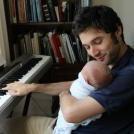Search the Community
Showing results for tags 'quiquern'.
-
4) The Magic Songs.mp3 Magic Songs.pdf This post is about the fourth movement of my piece called “Quiquern”. To read about the first few movements and about this piece in general, go here. Fragment 4: The Magic Songs Famished and delirious, Young Kotuko and the girl set out alone into the blizzard to find food for the starving village. As the dark and the cold and hunger devour them, the two children rave and hallucinate, unhinging themselves from the realm of men and into the realm of gods. As they descend, they sing songs of magic, songs buried deep in their memories, in their blood. Their voices rise and fall with the frozen wind. And through this silence and through this waste, where the sudden lights flapped and went out again, the sleigh and the two that pulled it crawled like things in a nightmare — a nightmare of the end of the world at the end of the world. The girl was always very silent, but Kotuko muttered to himself and broke out into songs he had learned in the Singing–House — summer songs, and reindeer and salmon songs — all horribly out of place at that season. He would declare that he heard the tornaq growling to him, and would run wildly up a hummock, tossing his arms and speaking in loud, threatening tones. To tell the truth, Kotuko was very nearly crazy for the time being; but the girl was sure that he was being guided by his guardian spirit, and that everything would come right. She was not surprised, therefore, when at the end of the fourth march Kotuko, whose eyes were burning like fire-balls in his head, told her that his tornaq was following them across the snow in the shape of a two-headed dog. The girl looked where Kotuko pointed, and something seemed to slip into a ravine. It was certainly not human, but everybody knew that the tornait preferred to appear in the shape of bear and seal, and such like. It might have been the Ten-legged White Spirit–Bear himself, or it might have been anything, for Kotuko and the girl were so starved that their eyes were untrustworthy. They had trapped nothing, and seen no trace of game since they had left the village; their food would not hold out for another week, and there was a gale coming. A Polar storm can blow for ten days without a break, and all that while it is certain death to be abroad. Kotuko laid up a snow-house large enough to take in the hand-sleigh (never be separated from your meat), and while he was shaping the last irregular block of ice that makes the key-stone of the roof, he saw a Thing looking at him from a little cliff of ice half a mile away. The air was hazy, and the Thing seemed to be forty feet long and ten feet high, with twenty feet of tail and a shape that quivered all along the outlines. The girl saw it too, but instead of crying aloud with terror, said quietly, “That is Quiquern. What comes after?”
-
The dogs’ meat was taken for human use, and Amoraq fed the team with pieces of old summer skin-tents raked out from under the sleeping-bench, and they howled and howled again, and waked to howl hungrily. One could tell by the soap-stone lamps in the huts that famine was near. In good seasons, when blubber was plentiful, the light in the boat-shaped lamps would be two feet high—cheerful, oily, and yellow. Now it was a bare six inches Amoraq carefully pricked down the moss wick, when an unwatched flame brightened for a moment, and the eyes of all the family followed her hand. The horror of famine up there in the great cold is not so much dying, as dying in the dark. All the Inuit dread the dark that presses on them without a break for six months in each year; and when the lamps are low in the houses the minds of people begin to be shaken and confused. But worse was to come. The underfed dogs snapped and growled in the passages, glaring at the cold stars, and snuffing into the bitter wind, night after night. When they stopped howling the silence fell down again as solid and heavy as a snowdrift against a door, and men could hear the beating of their blood in the thin passages of the ear, and the thumping of their own hearts, that sounded as loud as the noise of sorcerers’ drums beaten across the snow. One night Kotuko the dog, who had been unusually sullen in harness, leaped up and pushed his head against Kotuko the boy’s knee. Kotuko patted him, but the dog still pushed blindly forward, fawning. Then Kadlu waked, and gripped the heavy wolf-like head, and stared into the glassy eyes. The dog whimpered and shivered between Kadlu’s knees. The hair rose about his neck, and he growled as though a stranger were at the door; then he barked joyously; and rolled on the ground, and bit at Kotuko’s boot like a puppy. ‘What is it?’ said Kotuko; for he was beginning to be afraid. ‘The sickness,’ Kadlu answered. ‘It is the dog sickness.’ Kotuko the dog lifted his nose and howled and howled again. To learn more about this music, please visit: https://www.senigaglia.com/quiquern-dog-sickness/

